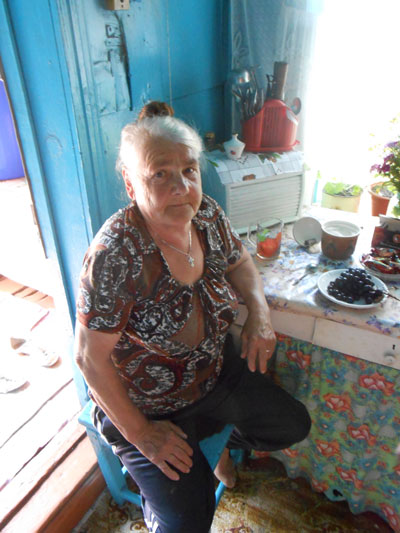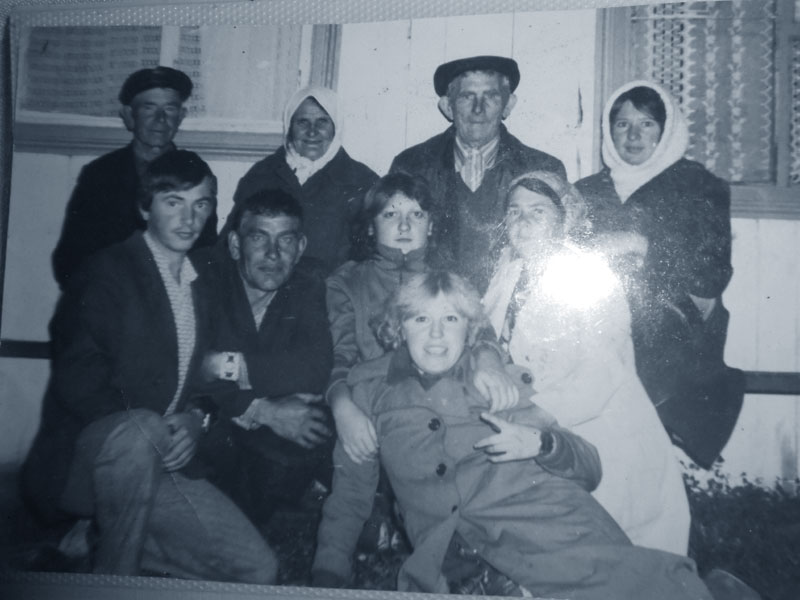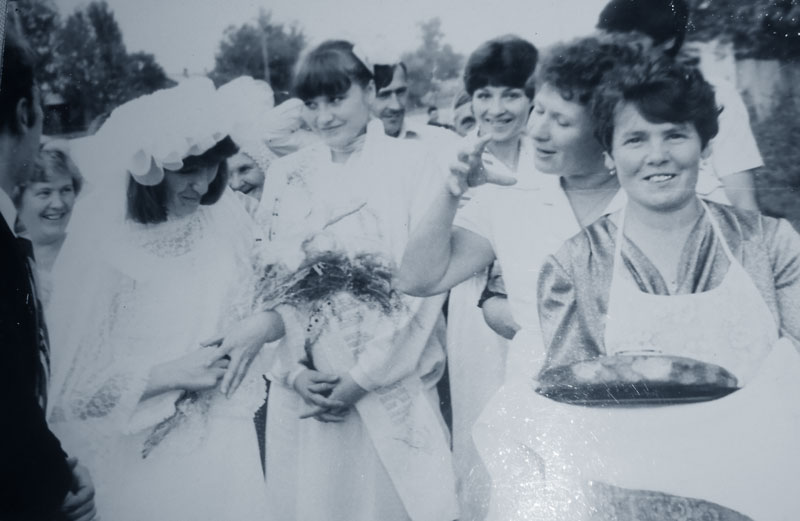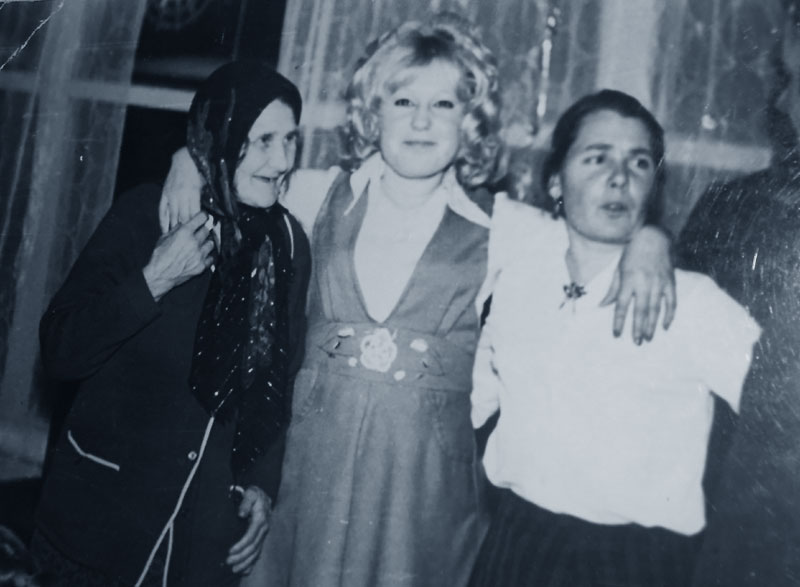









 Maria Viktorovna Balzer (maiden name Greb) got to Siberia with her
Volga-German parents - Maria Fedorovna and Viktor Friedrichovich. The Greb
family, as many other Volga residents of German nationality, was exiled in
August 1941 and deported to Siberia in freight-cars. In the villageof Lugovoe,
Rovensk District, Saratov Region, they had owned a house and a farmstead, but
while the deportation was in progress they could not manage to pack any of the
more value objects and take them along. Maria Viktorovna only news from her
mother’s reports about how the family used to live before their exile, for our
respondent was just five years old at that time, brother Kostya – three. During
the re-settlement the relatives were separated from eachother. The parents of
Viktor Friedrichovich’s father, his brother and his sister got to Bashkiria (they
only met again many years later, after the regime of special re-settlement had
already been abolished).
Maria Viktorovna Balzer (maiden name Greb) got to Siberia with her
Volga-German parents - Maria Fedorovna and Viktor Friedrichovich. The Greb
family, as many other Volga residents of German nationality, was exiled in
August 1941 and deported to Siberia in freight-cars. In the villageof Lugovoe,
Rovensk District, Saratov Region, they had owned a house and a farmstead, but
while the deportation was in progress they could not manage to pack any of the
more value objects and take them along. Maria Viktorovna only news from her
mother’s reports about how the family used to live before their exile, for our
respondent was just five years old at that time, brother Kostya – three. During
the re-settlement the relatives were separated from eachother. The parents of
Viktor Friedrichovich’s father, his brother and his sister got to Bashkiria (they
only met again many years later, after the regime of special re-settlement had
already been abolished).
The Yelovsk sovkhozin Balakhtinsk District, Krasnoyarsk Territory, became the family’s new place of residence. Many German re-settlers were taken to this village. The Siberian people behaved in quit a tolerant way towards the newcomers. The mother almost immediately took up a job as a milkmaid; the father was mobilized to the “trudarmy” already in 1942. In the beginning there existence was at starvation level. In order to get at least something or other to feed her children with, the mother collected ears from the field, which had dropped and remained there after the grain harvest. Afterwards she dried them on the stove and then baked flat cakes. Soonafter, however, Maria Fedorovna was arrested just because of these ears – they accused her of having committed “theft of government property”. She was sentenced to a six years’ camp detention. And there, under prison regime, Maria Fjedorovna began to learn a little Russian. She was unable to read and write and spoke exclusively German, but among the prisoners there was a Russian mistress, who was not just able to speak German, but also held lessons to Maria Viktorovna’s mother in Russian. Maria Fedorovna recalled that she used to pray all these six years for her children, pleading with God that they would survive. In the camp she managed to get a job as a cook, and it is probably due to this fact that she stayed alive. Viktor Friedrichovich learned Russian while he was with the „trudarmy“.
The children, who had practically become orphans, were taken to the Syrsk (Balakhtinsk) children’s home. Fortunately, they were not separated, so that aftermath brother and sister were in a position to support each other according to their possibilities. Tamara Vasilevna, the director of the children’s home showed amazing pity towards the German children. “She was very good-hearted and commiserated with us“, Maria Viktorovna recalls. The woman fed them additionally and took care of them. This was particularly important during the war, since everybody was starving and the children, as a result of permanent malnutrition, suffered from rickets. When the mother returned home in 1948, Tamara Vasilevna organized a job for her – with the subsidiary plot attached to the children’s home (as a vegetable gardener), and provided her with a little room to live in. „I have no idea, why I became so fond of these German children“– confessed the director of the children’s home to their mother some time later.
Roughly in 1949 the father returned from the „trudarmy“. Gradually they rearranged their life. The mother took up a job as a milkmaid with the farm again, the father worked as a lumberjack. Soonafter there were additions to the Greb family – another five children were born. Later Friedrichovich bought a house, which the whole big family moved into. However, the relationship between both parents was a complicated one. Maria Viktorovna is of the opinion that all responsibility for the children weighed too heavily on the mother’s shoulders; moreover, she had to cope with the somewhat difficult character of her husband.
At the time when the father returned home, the elder children were attending
school. Maria Viktorovna and her brother both completed four terms. Maria und
Kostya worked hard from their early days. At the beginning of the 1950s the
brother herded pigs, his sister was a milkmaid. Our respondent recalls from
those days that the representatives of the different nationalities lived
together in a harmonious and friendly way.
In 1962 Maria Viktorovna got married to Friedrich Johannesovich Balzer. The
choice in favor of a compatriot was made by her mother. It was her who insisted
on Maria to marry a German. She had already been friends with the Balzer family
before her daughter’s marriage and found that this man would be the right one.
The young people got two children, but no happy family life came off. In 1970
Maria Viktorovna and her children removed to Kazachinskoe, where she began to
work as a technician for the mobile mechanical department. The mother’s brother,
Jakob Koch, lived in Kazachinskoe, as well.
At home the parents used to speak German with their children, but after they had died, their mother tongue gradually fell into oblivion. Thus, Maria Viktorovna’s children do not know a single word of German any more. However, Maria Viktorovna preserved religious catholic traditions which her mother taught her. When they were still living at the Volga, she and her brother had been baptized according to catholic custom and practice. In the year 2000 Maria Viktorovna had the intention to convert to the orthodox faith, for there was no catholic institution in the vicinity. The local orthodox cleric tried to talk Maria Viktorovna out of her wish saying that a change of confessions was not really worthwhile, after all. She still keeps the German bible at home, which her mother brought over from the Volga. This very rare book looks all tattered, but Maria Viktorovna and I discovered between the pages a yellowed piece of quad paper, on which a short prayer had once been written by hand. The bible is the most important, most valuable keepsake of her mother. Maria Fedorovna was an outstanding master of handicraft – she was good at knitting (cardigans, scarves) and also instilled this into her daughters. In remembrance of our meeting Maria Viktorovna gave me a beautiful bowl, which she knitted by herself. And she showed me many more objects fabricated by her own hands.
In Siberia the Germans tried their best to keep the German traditional cooking tradition. Maria Fedorovna made Galushki (thick, soft noodles; translator’s note), baked strudel and Riwwelkuchen (streusel cake; translator’s note) and passed her special cooking skills to her children. Maria Viktorovna to this day is passionate about baking German cakes, which she likest o entertain her brothers and sisters with. Meanwhile Valya, Maria Fedorovna‘s grand-daughter, took over the national gastronomic “baton”. The mother was a good singer, as well. When she met her compatriots, she often sang German songs. Maria Viktorovna inherited from her mother the good-natured, cheerful mind, the passion about dancing and singing, unfortunately, she confesses, she sins Russian songs only.
The wish to leave Siberia never came up. „This is the place where my children were born and grew up“– Maria Viktorovna explains in short words. And now her grand-children are grown-up, too, and please her with their successes. None of the many brothers and sisters left the country for their historic homeland Germany.
Maria Viktorovna preserved her optimism and love for life, despite her old age. She talks in warm words about life in Siberia and the people she is surrounded by.

The Greb family in the 1980s

Marriage in 1980. M.V. Balzer welcomes the young couple with riwwelkuchen.

M.V. Balzer (on the right) with mother and sister, 1980s.

Letter to M.V. Balzer

Letter to M.V. Balzer 2

Old German bible, which M.V. Balzer received from her mother

Pages of the German bible from M.V. Balzer

Note by M.V. Balzer’s mother (found inside the bible)
Interview: Yelena Zberovskaya
(AB – remarks by Aleksei Babiy, Krasnoyarsk „Memorial“Organization ) Ninth expedition of the Krasnoyarsk "Memorial“ Organization and the Pedagogic College in Yeniseysk, Vorokovka-Kasachinskoe-Rozhdestvenskoe 2014.